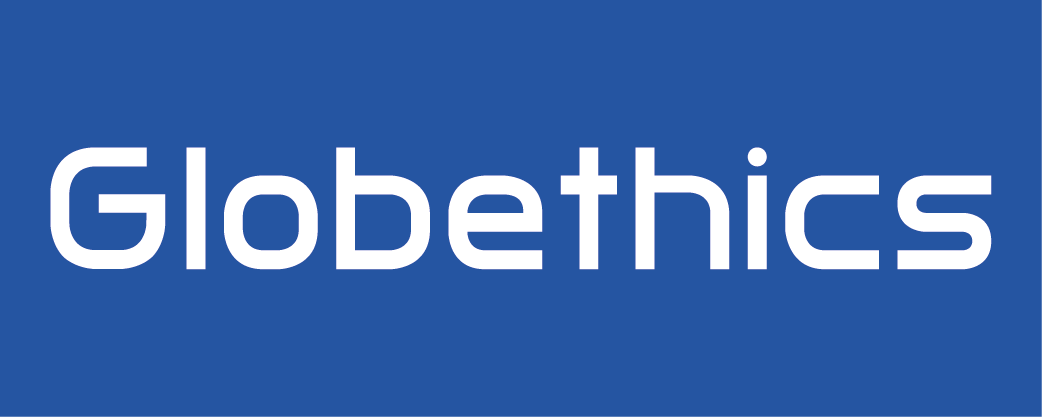Archives
-
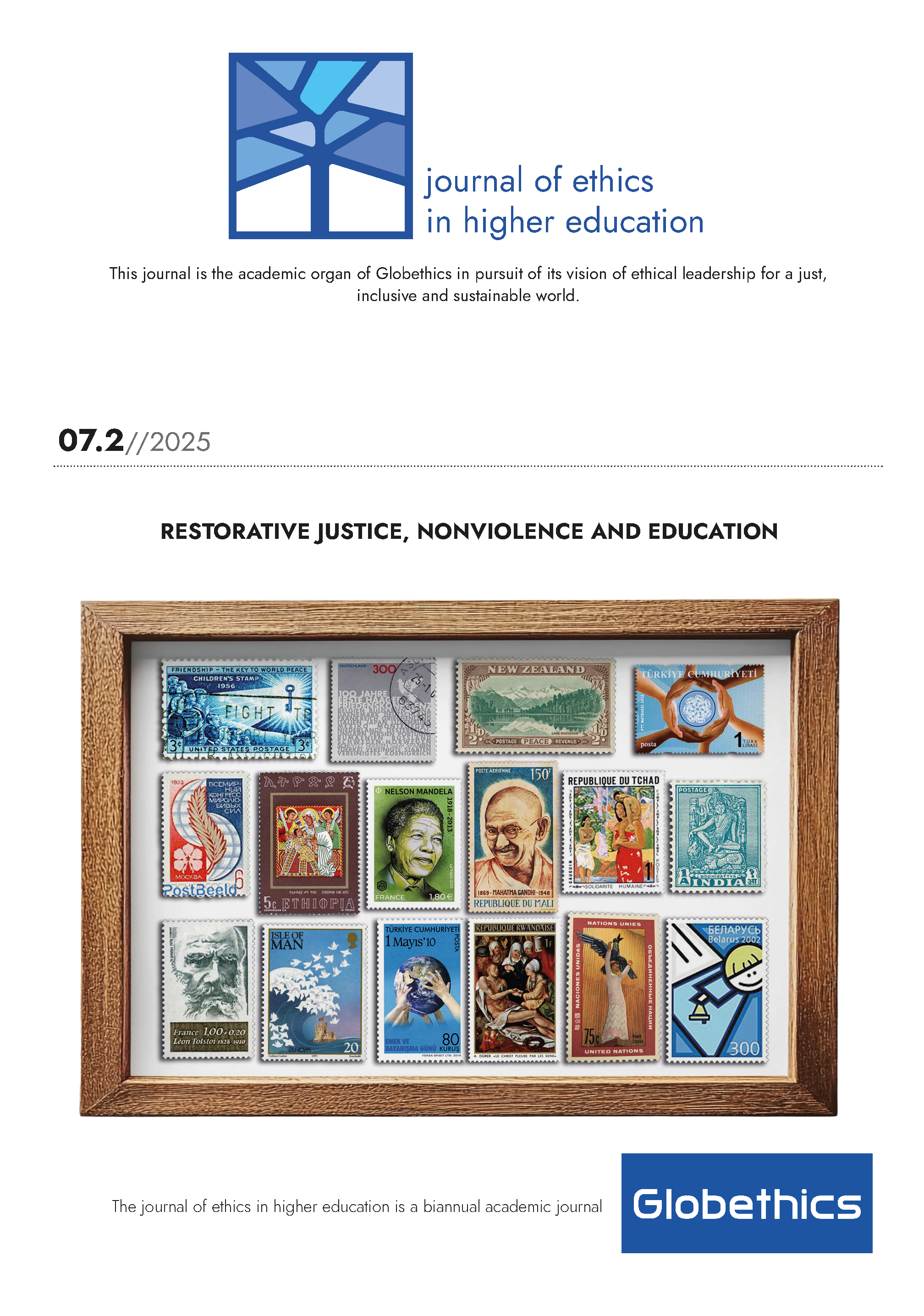
Restorative Justice, Nonviolence and Education
No. 7.2 (2025)Issue 7.1 (2025) brings together scholarly contributions that critically explore nonviolence and anarchism not merely as utopian aspirations but as viable and practical frameworks for justice, solidarity, and social transformation. Contributions address a range of themes, including the relationship between resilience and nonviolent education; the role of communication and empathy in conflict resolution; critiques of militarism and transactional conceptions of politics; and the potential of associative civil societies and organizations in development and peacebuilding. By integrating philosophical, historical, and contemporary perspectives, Issue 7.1 (2025) examines how traditions of nonviolence and anarchism may inform constructive alternatives to violence in both theory and practice.
Issue 7.2 (2025) provides space for non-thematic contributions that engage with applied ethics in educational contexts and reflect on principles of sound institutional governance. Key areas of inquiry include the teaching of business ethics, intercultural dialogue for climate action, ethical management of cyber environments in higher education, digital ethics in Rwanda, and value reorientation within Nigerian tertiary institutions, among others.
-
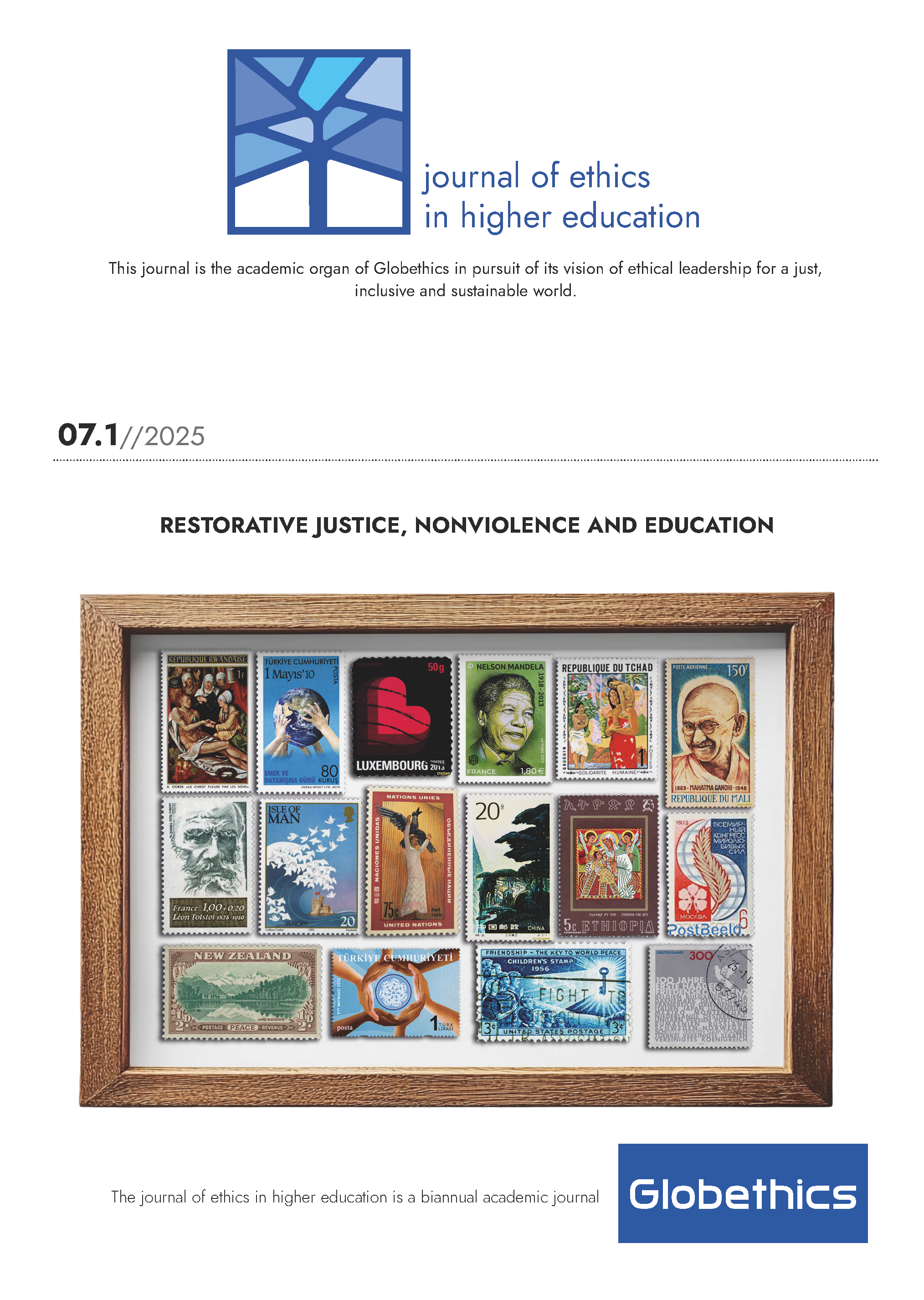
Restorative Justice, Nonviolence and Education
No. 7.1 (2025)Issue 7.1 (2025) brings together scholarly contributions that critically explore nonviolence and anarchism not merely as utopian aspirations but as viable and practical frameworks for justice, solidarity, and social transformation. Contributions address a range of themes, including the relationship between resilience and nonviolent education; the role of communication and empathy in conflict resolution; critiques of militarism and transactional conceptions of politics; and the potential of associative civil societies and organizations in development and peacebuilding. By integrating philosophical, historical, and contemporary perspectives, Issue 7.1 (2025) examines how traditions of nonviolence and anarchism may inform constructive alternatives to violence in both theory and practice.
Issue 7.2 (2025) provides space for non-thematic contributions that engage with applied ethics in educational contexts and reflect on principles of sound institutional governance. Key areas of inquiry include the teaching of business ethics, intercultural dialogue for climate action, ethical management of cyber environments in higher education, digital ethics in Rwanda, and value reorientation within Nigerian tertiary institutions, among others.
-
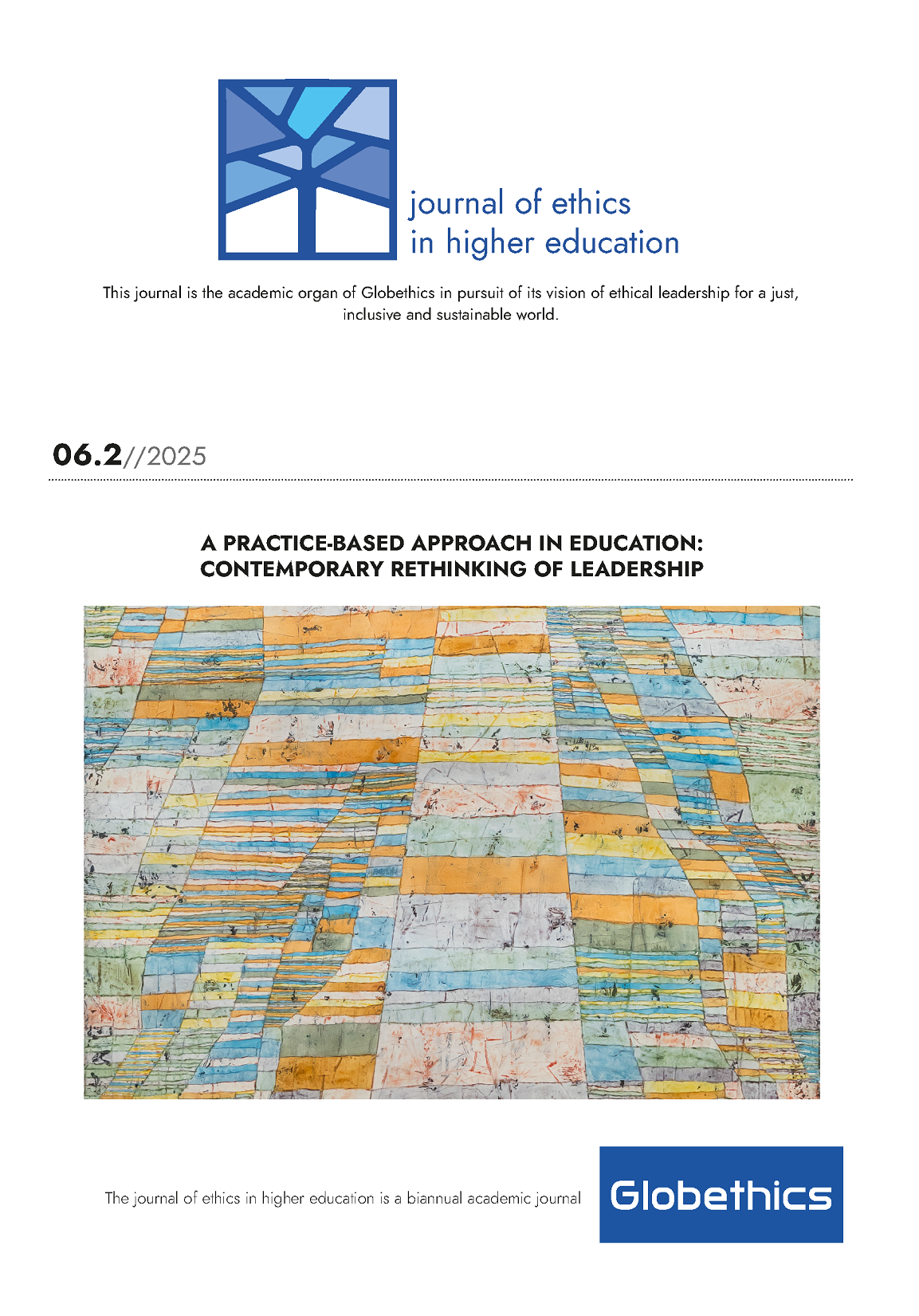
A Practice-based Approach in Education: Contemporary Rethinking of Leadership
No. 6.2 (2025)Issue No. 6 is gathering contributions addressing all aspects from historical, religious and philosophical roots and key models or systematic theories, to very practical case studies and tool-based approaches. Critical thinking on governance and leadership as well as pragmatic use of concrete impactful strategies are welcome. Business leaders, educational leaders, and the public interest are different levels of how leadership unfolds from the family to large spheres of economic and social interests, where ethics and mutually interconnected aspects of the reality play a crucial role in decision-making and the solving of ethical dilemmas.
Emerging technological challenges bring to responsible leadership new faster ways of getting around obstacles in the way work is carried out, but fundamental issues remain profoundly human in character. This Issue has two volumes the first proposing the more technical part of the discussions, the second opening the horizon to more creative attempts; this later includes as well some non-thematic articles.
-
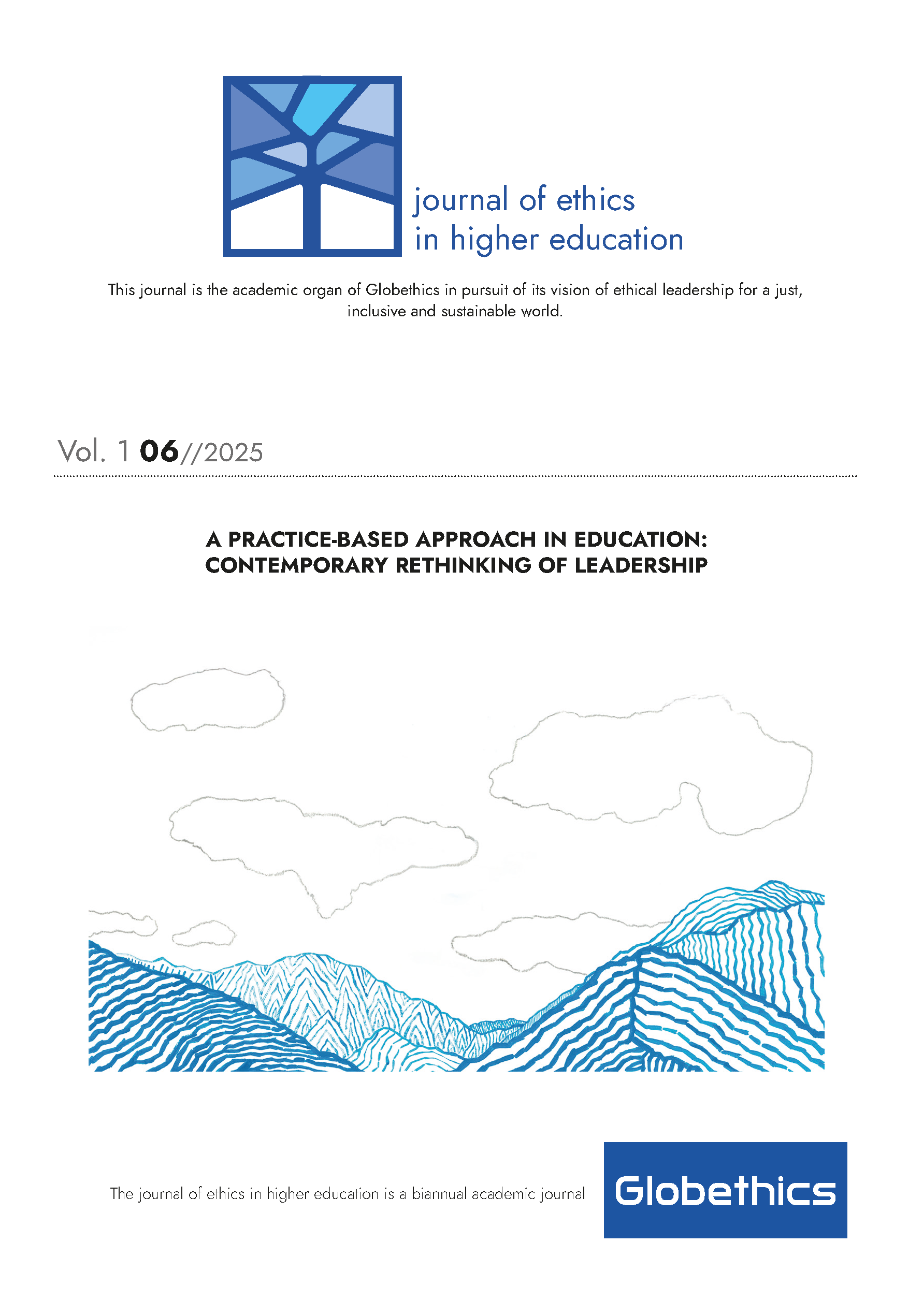
A Practice-based Approach in Education: Contemporary Rethinking of Leadership
No. 6.1 (2025)
Among the most consistent ways of integrating theory into practice and redefining the way a rule-based order should function, the practice-based approach has culminated as a true positivist redefinition of norms in all possible domains, transforming how traditional leadership is conceive into a model of [rule of practice based] ethical leadership.Issue No. 6 is gathering contributions addressing all aspects from historical, religious and philosophical roots and key models or systematic theories, to very practical case studies and tool-based approaches. Critical thinking on governance and leadership as well as pragmatic use of concrete impactful strategies are welcome. Business leaders, educational leaders, and the public interest are different levels of how leadership unfolds from the family to large spheres of economic and social interests, where ethics and mutually interconnected aspects of the reality play a crucial role in decision-making and the solving of ethical dilemmas.
Emerging technological challenges bring to responsible leadership new faster ways of getting around obstacles in the way work is carried out, but fundamental issues remain profoundly human in character. This Issue has two volumes the first proposing the more technical part of the discussions, the second opening the horizon to more creative attempts; this later includes as well some non-thematic articles.
-
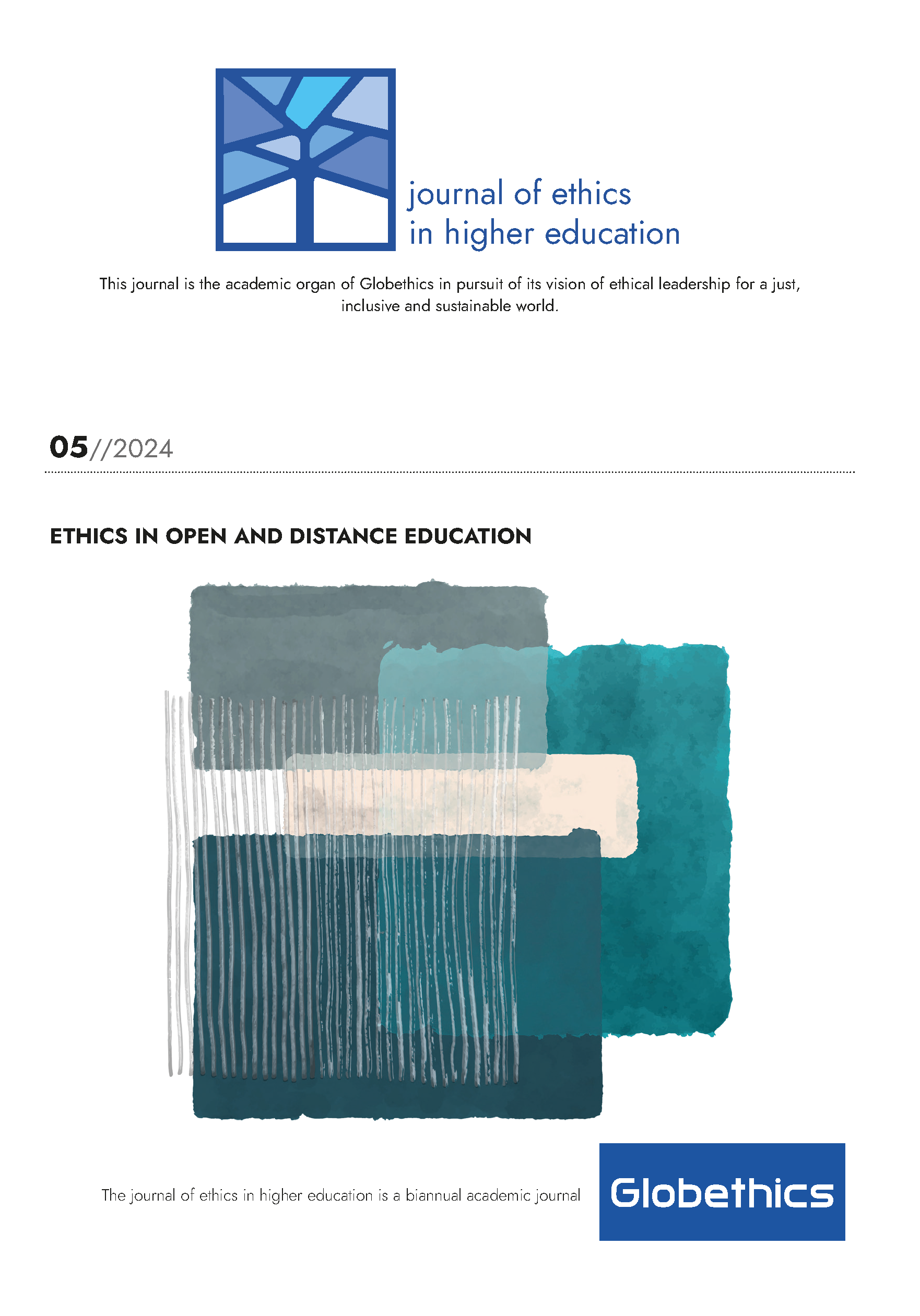
Ethics in Open and Distance Education
No. 5 (2024)Open education is in comparison to the UNESCO 2021 recommendation for open science, based primarily on the intellectual virtue of open science. We easily notice in this text the great admiration for a philosophical positivism, placing academic knowledge and science in the center of some collaborative practices: “open, transparent, collaborative and inclusive scientific practices, coupled with more accessible and verifiable scientific knowledge subject to scrutiny and critique, is a more efficient enterprise that improves the quality, reproducibility and impact of science, and thereby the reliability of the evidence needed for robust decision-making and policy and increased trust in science.” There is a “vital importance of science, technology and innovation (STI)”, if not for “promoting democracy and peace” or for complying with the UN “Sustainable Development Goals”, open science or its younger brother open education are meant surly to reduce a de facto economically unequal situation in the world, which can be depicted as distance or “digital gaps” existing “between and within countries”.
Open economy of knowledge suggests a ground principle of negative freedom not to be constrained in an access to some basic goods. We should think about natural conditions, not only political and economical or human decision related constraints: Africa, and the least developed countries (LDCs), landlocked developing countries (LLDCs), show that natural types of constraints are everywhere. Interestingly, twelve among the poorest countries (with the lowest Human Development Index, (HDI) scores) are landlocked, or isolated places. With eight thematic articles focusing on open and distance education, JEHE 5(2024) is reaching closer to the heart of interdisciplinary research, bringing thought elements for policy in artificial intelligence and education, by showing that good conversations on ethics can bring teaching and research beyond the traditional gaps.
-
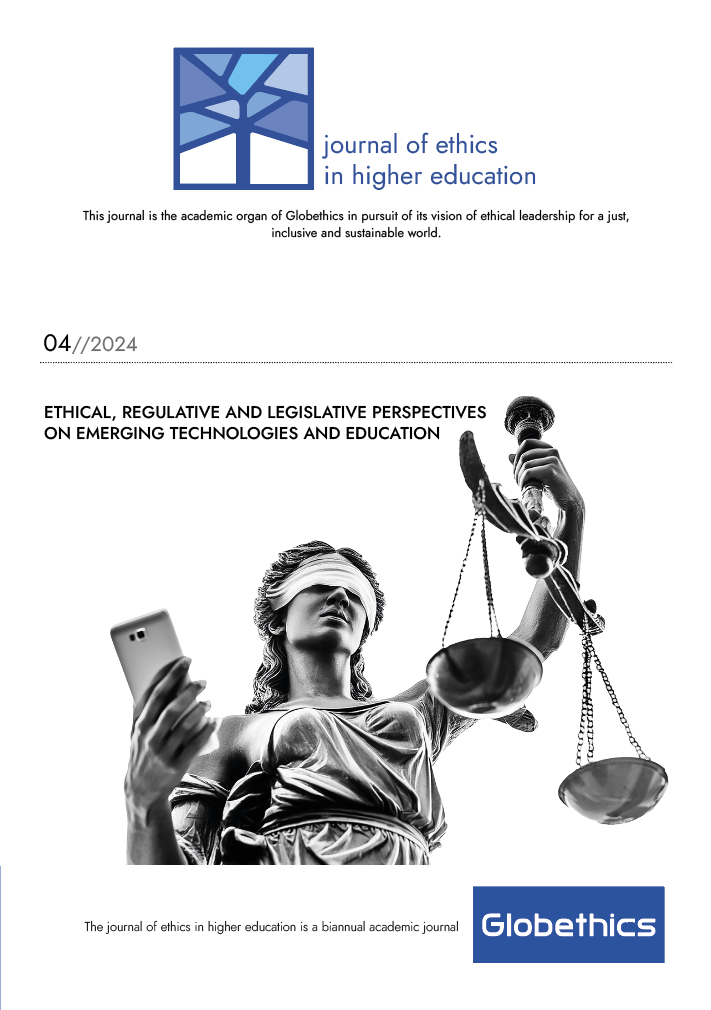
Ethical, Regulative and Legislative Perspectives on Emerging Technologies and Education
No. 4 (2024)Ethical considerations in emerging technologies for education entails clear options on at least four different sets of concepts. Emerging technologies, such as artificial intelligence (AI) are transforming the landscape of education. However, their adoption raises ethical questions. One challenge lies probably in obtaining informed consent from students in the changing environment of the places where they study, in close interaction with AI technological innovations.
There are regulations and legal perspectives that both bring solutions but also challenges.
Education and science, as distinct from technology, may need to be redefined from a philosophical perspective.Technologies of information open a new dimension on regulatory and legal aspects in relation to bringing more justice on a global scale. Technology and science are two distinct fields, entailing a set of different disciplines. These days, public media give us the impression that supercomputers, which are used to analyse tens of millions of risk scenarios, will solve most of our concrete risks, but is it always useful to use the computing power of a computer to maximise societal stability and prevent concrete harms?
Before we think about regulating emerging technologies, we might need to think about what our problems require, often there will be a delicate balance, between knowing the reality of the problem, before we think of the solution, and before we check if we have mastered some physical reality-based application of our problem-solving thinking. On the one hand, rapid technological advancements exist, on the other scientific use of intelligence in solving concrete problems which is not only a matter of technology, is rather often related to defining the right pragmatic use of sciences. For example, the question of the predictability of risks has always been a complex issue, and technologies in the past as today, posed challenges as much as they brought possible solutions. There are many situations, where we can describe a set of phenomena, but cannot predict, like tossing a coin in the air and trying to guess which way it will land.
As many contributions to Issue 4(2024) are coming from:
-Stadio Education: "Technology Enabling Curriculum Transformation",
-Globethics: "ICDE Leadership Summit 2024",
The Board of Editors of JEHE express their gratitude for the kind authorisation to publish by the authors and by the institutions. -
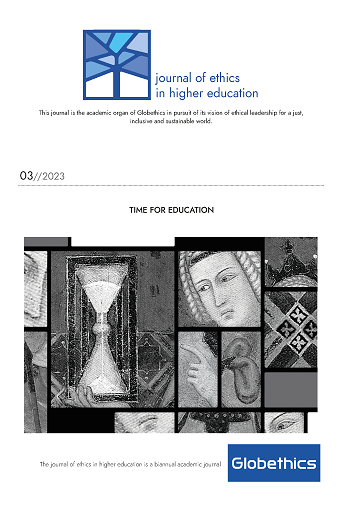
Time for Education
No. 3 (2023)Issue 3(2023) of the Journal of Ethics in Higher Education is a collection of twelve articles in three parts: first, thematic papers related to the title of the Issue “Time for Education”; second, a non-thematic section, and third, book reviews.
In the first part, the Issue explores various aspects of time in education, philosophy, and ethical implications. It delves into philosophical inquiries about time, discussing McTaggart's paradox and its roots. Byung-Chul Han's views on temporal experiences in modernity are highlighted, examining the impact on thinking and learning. Wilhelm von Humboldt's influence on education and the relevance of ethics in educational transformation are also explored, as time is translated into a transformative and human capacity. In this first part, the role of a philosophy of time is emphasised in understanding paradoxes and guiding educational transformations. The key role of our perception of the future and the role of a humanistic education focusing on the most vulnerable persons are explored. Additionally, the papers discuss the transformative power of education as poetic engagement with short aphoristic reflections pointing out the possibility of an ethical evolution in time.
In the second, non-thematic part, two articles analyse the use of AI in higher education and the challenges of AI on academic integrity. A third contribution puts the focus on the context of gender in education, and highlights challenges in the DR Congo regarding the vulnerability of women due to cultural norms. One article is a case study of ethical education in Yezreel Valley College (Israel).
In the final section, the first book review looks at the African context: religious communities and sustainable environmental engagements in the Southern African context. The second review is global in scope, highlighting the findings of the 30 Years Report on practical ethics by The Business Ethics Center of Corvinus University, Budapest (Hungary). -
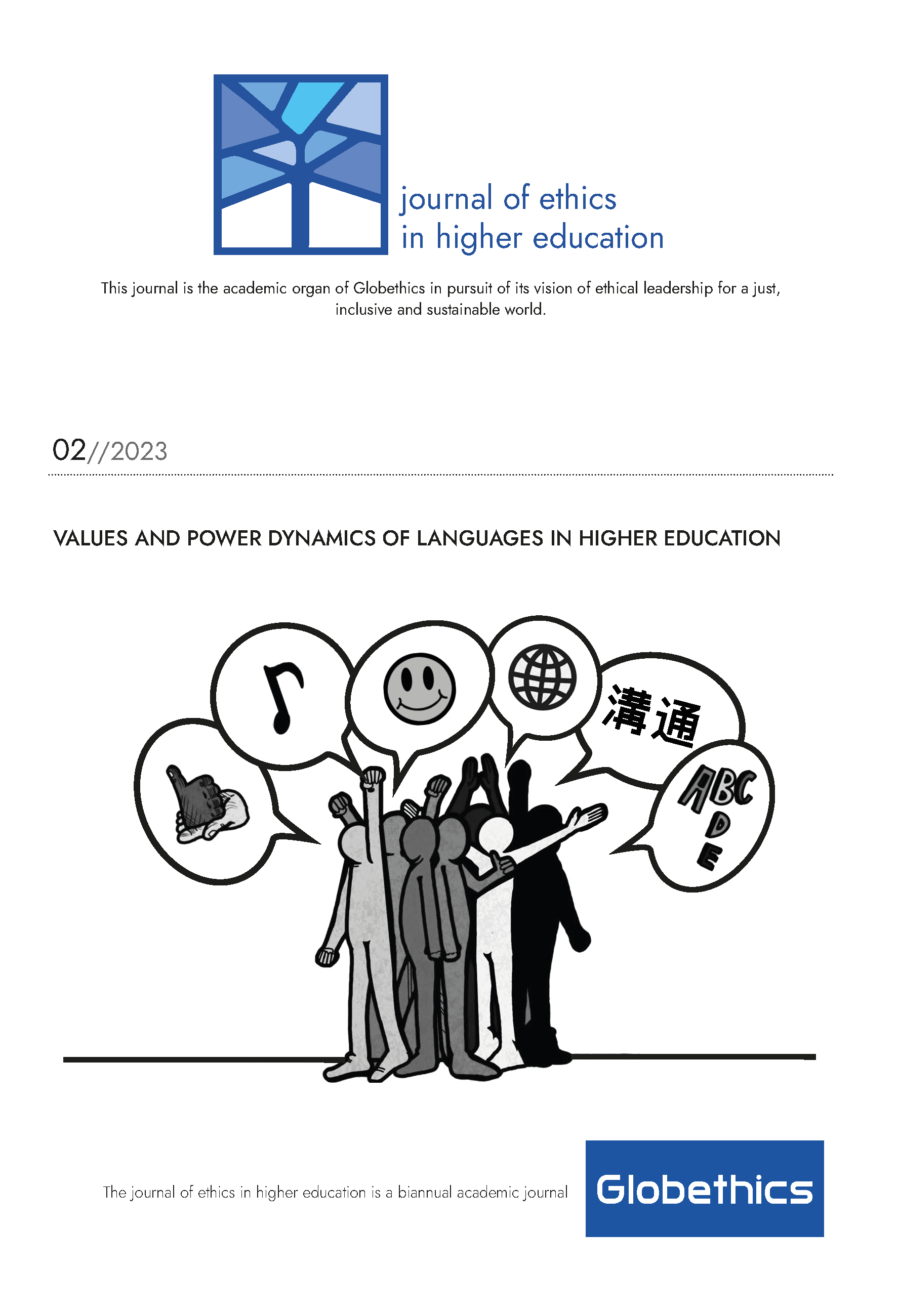
Values and Power Dynamics of Languages in Higher Education
No. 2 (2023)This second issue is focusing on different ways in which language or what we could call the semantic level of the reality is relevant for thinking, and in particular for knowledge acquisition at the university or in education institutions. 1) Language could be understood as an obstacle if a person needs to learn a new language to go to school, but cannot have a generous access to his/her own culture: this is the case in the so-called the 'bilateral lingual' experiences, during the colonial eras, for many people living in Africa, but also in many countries where borders have been shifting over the 20th century. 2) As 'interpersonal phenomenon', or 3) as musical universal medium for peace and compassion, one language could represent 4) a space open for 'hospitality', as when speaking our mother tongue, we take the language of the speaker's dominant and home language. Of course, instrumentalisation remains not only a welcoming mastering of grammar, as language is necessary for the transmission or exchange of information, it plays a role in the control of the behaviour of others. 5) The Word of God, in particular through the written form of the language and the interpretation of sacred texts of great religious traditions shows how from an humble speech we may discover not only sincerity, authenticity and the power of communication but also the majesty of words, which symbolically inspire us and transmit faith. 6) The deep challenges of translation of concepts are related to the double side of each exercise of translation: the first is a purely linguistic phenomenon, captured by the obvious differences in the languages themselves, the second is more complex, it has to do with the difference between cultures. 7) The development of emerging technologies have made not only a 'society of communication' almost a kind of tautology, it is generating unexpected ethical problems, as when artificial intelligence becomes difficult to detect in learning assignments.
-
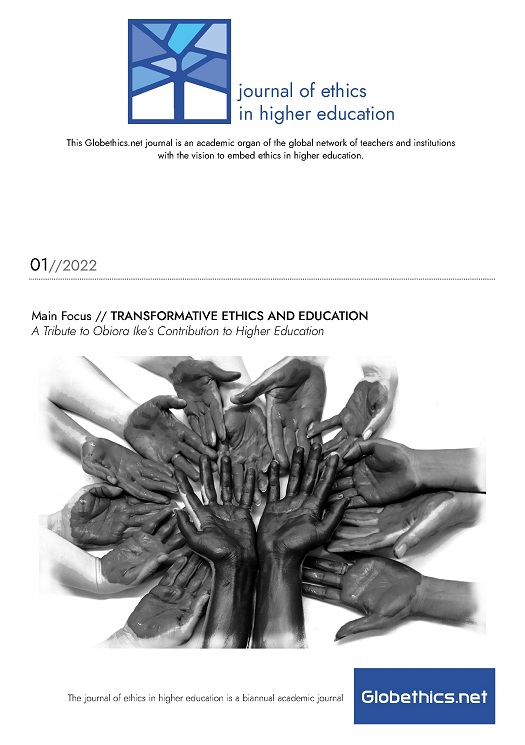
Transformative Ethics and Education: A Tribute to Obiora Ike’s Contributions to Ethics in Higher Education
No. 1 (2022)The first issue is dedicated to Obiora Ike's ideals in ethics and education, and honoring his contributions to these fields in theory and praxis. The articles in this special issue show a broad range of scholarly engagement with the theme. On the one hand, they demonstrate how transformative ethics and education are intertwined with theological and philosophical rationales, and on the other hand how an integral and whole-person development paradigm emerges from some concrete models of practices, exploring essential facets of integrity and quality education.

